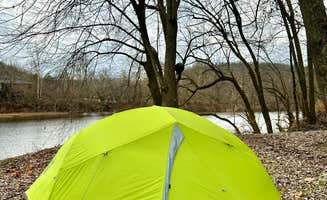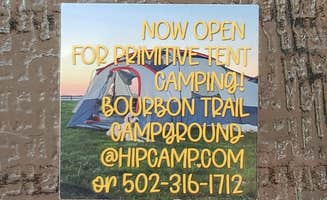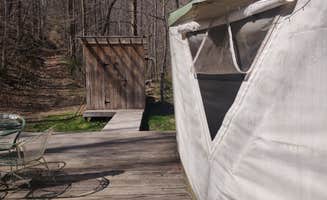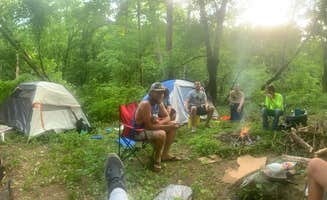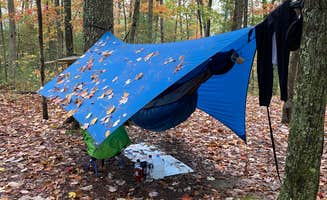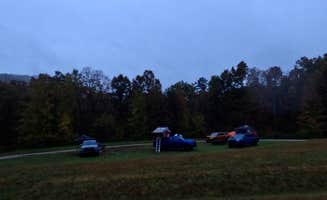Tent campsites near Lexington, Kentucky offer primitive to semi-developed options within a 60-mile radius of the city. Most sites sit at elevations between 600-1,200 feet in the rolling Bluegrass Region and eastern foothills. Summer temperatures average 85°F with high humidity, while spring and fall camping seasons offer milder conditions with average daytime temperatures of 60-75°F. Winter camping remains available at most locations but requires preparation for nighttime temperatures that regularly drop below freezing.
What to do
Hiking at multiple difficulty levels: The Daniel Boone National Forest contains over 600 miles of trails within driving distance of Lexington tent sites. "Hanson's point at the red river gorge is often called the best view of the Gorge. To get to Hanson's point you'll have to earn it by hiking for about 2.5 miles, but trust me when I say it's worth it," notes Wayne H. from Red River Gorge Adventures.
Paddling accessible waters: Kentucky River access points provide tent campers with paddling opportunities directly from some campsites. Benjamin A. shares about Wildcat Creek Farm: "The 'island' site is a nice little shaded area above the riverside. Off to the right corner of the site is a set of stairs leading down to the river with an area to take some chairs and relax by the water."
Wildlife viewing opportunities: Farm animals and native wildlife provide camping entertainment at several tent sites. "Such a quiet place. The resident goats, mules, donkeys and horses are very friendly - just like the hosts!" reports Elizabeth R. about her stay at Wildcat Creek Farm.
What campers like
Secluded riverside sites: The most requested tent camping spots offer water access combined with privacy. "This is my all time favorite campground... It's very spacious, I've camped on holiday weekends and never had other campers within 100 ft of my site," writes Josh J. about Red River Gorge Adventures.
Dark sky stargazing: The rural location of most tent sites provides minimal light pollution. Kurt B. describes HomeGrown HideAways: "The night sky of stars and quiet stillness brought a calm and peace from our busy week."
Multi-day backpacking options: Tent campers appreciate the ability to string together multiple primitive sites. "Some of our favorite backpacking. Getting little busy unless you're out deeper in the back country," explains Ted B. about the Red River Gorge Campground area.
What you should know
Gate restrictions: Some campgrounds control access during overnight hours. "They close the gates at night and don't open the gates till 8 am was the only drawback. The gate adds to the security of the campground I liked that they control coming and going at night times," notes Andrew C. about Red River Gorge Adventures.
Seasonal crowding patterns: Tent sites fill quickly during peak seasons. "I've also been on weekends where I was the only camper there," shares Josh J. about Red River Gorge Adventures, highlighting the variability between peak and off-peak seasons.
Permit requirements: Backcountry camping requires specific permits at some locations. Wayne H. advises about Hanson's Point: "The campsites at Hanson's Point are primitive campsites, so make sure you bring EVERYTHING you need for your stay."
Tips for camping with families
Animal interactions: Children particularly enjoy campgrounds with friendly farm animals. "We enjoyed our stay, and our kids loved the animals and the creek! Great hospitality," says Katelyn W. about her family's experience at Wildcat Creek Farm.
Controlled swimming spots: Safe water access points provide family-friendly recreation. Josh J. shares this insider tip: "If you wade out into the water about 15ft upstream of the boat launch, the river is relatively flat with a sandy bottom that is about 5' at normal water level. Excellent place for an afternoon swim."
Alternative shelter options: Some campgrounds offer more substantial shelter alongside tent sites. Cassandra C. describes her family's stay at HomeGrown HideAways: "We stayed at the Yome, and it was perfect for our family of four. Instead of sleeping in it, which would have been perfectly comfortable, we actually used it as more of an extra shelter and we pitched out tents in the field in front of the Yome."
Tips from RVers
Horse camp alternatives: Tent campers can often use horse camps when sites are available. John from White Sulphur Horse Camp explains: "We try and use horse camps when traveling in larger groups since they have more space and are not always used... the place was clean, restroom facilities were stocked with TP."
Limited cell service: Connectivity varies widely between campgrounds. "There was slight cell service for Verizon & AT&T, enough for maybe text but not very consistent," notes John about White Sulphur Horse Camp, a consideration for those needing to stay connected.
Firewood quality varies: Purchased campfire wood quality differs between locations. Vince B. advises: "I would suggest bring your own fire wood and do not by it there at the camp the wood they gave us was not good and wouldn't catch fire."


